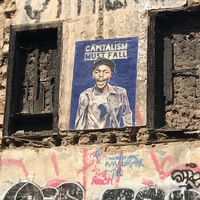
David Moffette
I'm an associate professor in the Department of Criminology at the University of Ottawa, located on unceded and unsurrendered Algonquin territory. I hold a PhD in Sociology from York University. I work on questions related to Spanish and Canadian immigration policies, critical border and security studies, racism and nationalism.
---------------------------------------------------------
PhD - Sociology, York University, 2015
MA - Anthropology, Université Laval, 2009
BA - International Studies, Université Laval, 2006
Contact: david.moffette@uottawa.ca
Official uOttawa Profile: http://socialsciences.uottawa.ca/crm/professor-profile?id=1630
-----------------------------------------------------------
Je suis professeur agrégé au Département de criminologie de l'Université d'Ottawa, située en territoire non-cédé de la nation algonquine. Je détiens un doctorat (PhD) de sociologie de l'Université York. Je travaille sur des questions qui touchent aux politiques espagnoles et canadiennes d'immigration, aux études critiques sur les frontières et la sécurité, le racisme et le nationalisme.
---------------------------------------------------------
PhD - Sociologie, Université York, 2015
MA - Anthropologie, Université Laval, 2009
BA - Études internationales, Université Laval, 2006
Contact: david.moffette@uottawa.ca
Profil officiel uOttawa: http://sciencessociales.uottawa.ca/crm/profil-professeur?id=1630
Phone: (613) 562-5800, ext. 1790
---------------------------------------------------------
PhD - Sociology, York University, 2015
MA - Anthropology, Université Laval, 2009
BA - International Studies, Université Laval, 2006
Contact: david.moffette@uottawa.ca
Official uOttawa Profile: http://socialsciences.uottawa.ca/crm/professor-profile?id=1630
-----------------------------------------------------------
Je suis professeur agrégé au Département de criminologie de l'Université d'Ottawa, située en territoire non-cédé de la nation algonquine. Je détiens un doctorat (PhD) de sociologie de l'Université York. Je travaille sur des questions qui touchent aux politiques espagnoles et canadiennes d'immigration, aux études critiques sur les frontières et la sécurité, le racisme et le nationalisme.
---------------------------------------------------------
PhD - Sociologie, Université York, 2015
MA - Anthropologie, Université Laval, 2009
BA - Études internationales, Université Laval, 2006
Contact: david.moffette@uottawa.ca
Profil officiel uOttawa: http://sciencessociales.uottawa.ca/crm/profil-professeur?id=1630
Phone: (613) 562-5800, ext. 1790
less
Related Authors
Josiah Heyman
University of Texas at El Paso (UTEP)
Bjorn Enge Bertelsen
University of Bergen
Jackie Dugard
Columbia University
Bob Jessop
Lancaster University
David Seamon
Kansas State University
Remo Caponi
University of Cologne
Armando Marques-Guedes
UNL - New University of Lisbon
Sarah Horton
University of Colorado Denver
Noe Cornago
University of the Basque Country, Euskal Herriko Unibertsitatea
Yannis Hamilakis
Brown University
InterestsView All (52)










Uploads
Single Author Books by David Moffette
Edited Books and Special Issues by David Moffette
Journal Articles & Book Chapters by David Moffette
The chapter explores theories of citizenship, the treatment of non-citizens, and citizenship revocation in Canada. OPEN ACCESS: https://repository.library.carleton.ca/concern/works/k643b269w?locale=en
Scholarship on police violence tends to either center the historical role of the institution in protecting an unequal social order or the individual use of force. To broaden our understanding and unpack how violence manifests in everyday interactions, we examined 251 accounts of police encounters in Ottawa, Canada. Finding that disrespect was disturbingly common, we developed a typology that highlights the spectrum of police disrespect as it manifests through: a) denial of bodily autonomy, b) demeaning verbal interactions, and c) disdain. We argue that everyday police disrespect may appear banal compared to the use of physical force, but that it is a significant part of a continuum of dehumanization that creates an atmosphere that renders police violence possible.
Abstract: Bridging prison and immigration justice is of utmost importance, and an obvious and strategic point of encounter for dialogue among activists and scholars working on these issues is immigra- tion detention. But as penal and carceral abolitionists have taught us, we cannot tackle prison injustice without addressing broader issues in policing, criminal law and other means of coercive social control. Taking my cues from this work, I suggest that we move upstream and look at the role of immigration policing in detention and deportation. The article draws from records obtained mostly through Access to Information (ATI) and Freedom of Information (FOI) requests to map out collaboration between the Canada Border Services Agency (CBSA) and municipal police forces in Toronto, Montreal and Vancouver. In looking for ways to limit police involve- ment in internal border control, the article discusses strategies to promote a culture of non-collaboration with immigration enforce- ment and build alternatives means of ensuring community safety and well-being in the spirit of police and border abolitionism.
http://journals.sagepub.com/doi/10.1177/1362480618811693
The chapter is written for advanced undergraduate students. I make a similar argument, in more details, in "Governing Immigration through Probation" (2014) listed below. Advanced readers may prefer the latter.
Abstract
Following the arrival of the MV Ocean Lady in 2009, four men were charged with human smuggling under s. 117 of the Immigration and Refugee Protection Act for having helped Sri Lankan asylum seekers reach Canada. Section 117 made it a criminal offence to aid and abet the unauthorized entry of asylum seekers, including when this was done for humanitarian reasons, to help family members, or as a matter of mutual aid. The case made its way to the Supreme Court and, in 2015, the court ruled in R v Appulonappa that s. 117 was too broad, potentially criminalizing humanitarian workers and family members who help transport asylum seekers, and should be interpreted in a strict manner. This article draws from pragmatic sociology to study the regimes of justification mobilized by various actors involved in, and around, R v Appulonappa between 2009 and 2015. It focuses on two sites of contestation that crystalized around divergent conceptions of fairness and safety, discussing how competing regimes of justification were used to advance stakeholder’s positions.
The chapter explores theories of citizenship, the treatment of non-citizens, and citizenship revocation in Canada. OPEN ACCESS: https://repository.library.carleton.ca/concern/works/k643b269w?locale=en
Scholarship on police violence tends to either center the historical role of the institution in protecting an unequal social order or the individual use of force. To broaden our understanding and unpack how violence manifests in everyday interactions, we examined 251 accounts of police encounters in Ottawa, Canada. Finding that disrespect was disturbingly common, we developed a typology that highlights the spectrum of police disrespect as it manifests through: a) denial of bodily autonomy, b) demeaning verbal interactions, and c) disdain. We argue that everyday police disrespect may appear banal compared to the use of physical force, but that it is a significant part of a continuum of dehumanization that creates an atmosphere that renders police violence possible.
Abstract: Bridging prison and immigration justice is of utmost importance, and an obvious and strategic point of encounter for dialogue among activists and scholars working on these issues is immigra- tion detention. But as penal and carceral abolitionists have taught us, we cannot tackle prison injustice without addressing broader issues in policing, criminal law and other means of coercive social control. Taking my cues from this work, I suggest that we move upstream and look at the role of immigration policing in detention and deportation. The article draws from records obtained mostly through Access to Information (ATI) and Freedom of Information (FOI) requests to map out collaboration between the Canada Border Services Agency (CBSA) and municipal police forces in Toronto, Montreal and Vancouver. In looking for ways to limit police involve- ment in internal border control, the article discusses strategies to promote a culture of non-collaboration with immigration enforce- ment and build alternatives means of ensuring community safety and well-being in the spirit of police and border abolitionism.
http://journals.sagepub.com/doi/10.1177/1362480618811693
The chapter is written for advanced undergraduate students. I make a similar argument, in more details, in "Governing Immigration through Probation" (2014) listed below. Advanced readers may prefer the latter.
Abstract
Following the arrival of the MV Ocean Lady in 2009, four men were charged with human smuggling under s. 117 of the Immigration and Refugee Protection Act for having helped Sri Lankan asylum seekers reach Canada. Section 117 made it a criminal offence to aid and abet the unauthorized entry of asylum seekers, including when this was done for humanitarian reasons, to help family members, or as a matter of mutual aid. The case made its way to the Supreme Court and, in 2015, the court ruled in R v Appulonappa that s. 117 was too broad, potentially criminalizing humanitarian workers and family members who help transport asylum seekers, and should be interpreted in a strict manner. This article draws from pragmatic sociology to study the regimes of justification mobilized by various actors involved in, and around, R v Appulonappa between 2009 and 2015. It focuses on two sites of contestation that crystalized around divergent conceptions of fairness and safety, discussing how competing regimes of justification were used to advance stakeholder’s positions.
Mots clés : pragmatisme, pratiques de frontière, espace, temps, juridiction
Abstract: Although sociologists have worked extensively on related topics, the study of borders continues to be a field dominated by geographers and political scientists. They are the ones who have suggested that we should study borders not as spatially located physical objects, but as assemblages of practices performed by various actors. I argue that by developing a pragmatic approach to the study of borders, one that pays attention to the multiple actors involved, their socio- temporal practices and their jurisdictional games, sociologists are poised to push the limits of this field of research. Furthermore, by urging sociologists to study the spatial, temporal, and jurisdictional dimensions of social practices, the “sociology of borders” presented in this article may promote a renewal of sociological analysis by reminding us to avoid reifying the social, and by encouraging us to resist distinguishing it from the spatial, the temporal, and the legal.
Key words: pragmatism, bordering practices, space, time, jurisdiction
Keywords
border, desirability, immigration, probation, sociology, Spain"
Keywords: Ceuta; Convivencia; European Border; Race; Securitization; Tolerance.
-----------
Over the last decade, a series of high-profile instances of police misconduct in Ottawa resulted in law enforce- ment coming under increased scrutiny. In this context the Experiences of Encounters with the Police in Ottawa (EEPO) research sought to document the experiences of individuals from disproportionately policed communities during encounters with police. The report draws on 208 encounter report forms and 43 interviews with individuals who had an interaction with police in Ottawa in the year prior to data collection.
Since the TPS has only implemented a partial “Don’t Ask” policy and remains opposed to a practice of non-disclosure, we hold the position that the Toronto Police Service remains an inaccessible service for undocumented Torontonians who fear being reported to the Canada Border Services Agency (CBSA), and potentially detained and deported. Data recently obtained through Access to Information requests also confirm what many undocumented Torontonians and service providers have been saying for years: that Toronto police officers continue to practice racial profiling to inquire into Torontonians’ immigration status, in contravention of their own “Don’t Ask” commitment.
We have found that the TPS is the most frequent user of the CBSA’s Warrant Response System. Described as “an important component in effecting removal orders” by the CBSA, the call centre is available 24 hours/day, 7 days/week to law enforcement officers who want to inquire whether an immigration warrant exists against a particular individual. In the period for which we have obtained data (part of 2014 and 2015), the TPS is responsible for 31% of all calls made by all law enforcement and transit agencies across the country. The TPS inquired more often than the RCMP, and more often than the police services of Montreal, Quebec City, Calgary and Vancouver combined.
The reason for these calls is also shocking. The data provided by the CBSA show that TPS calls were rarely for “database verification” or "warrant inquiry." Rather, 83% of all calls were placed to perform a “status check” – to actively seek out information about someone’s immigration situation. This troubling information confirms what we already knew: that TPS is not accessible to people with precarious immigration status and actively seeks to identify immigration status of undocumented Torontonians, putting them in danger of indefinite detention without charges or trial or deportation to places where their lives may be at grave risk."
--- Report commissioned by No One Is Illegal-Toronto. Co-authored by David Moffette, Karl Gardner, No One Is Illegal-Toronto, and the Immigration Legal Committee of the Law Union of Ontario.
---- See: http://toronto.nooneisillegal.org/ImmigrationsDirtyWork
In the December 2021 mandate letter to the newly appointed Minister of Immigration, Refugees and Citizenship, the Liberal government tasked him with exploring ways of regularizing status for undocumented workers who are contributing to Canadian communities. Sean Fraser has since said he s working on designing a regularization program that can help address this issue. In May, MPs passed motion M-44 urging the government to design a plan to provide permanent residency to temporary foreign workers. If planned and executed correctly, these programs could be a historic opportunity to improve the lives of up to 1.7 million people who live in Canada without a secure status.
https://ricochet.media/en/1934/undocumented-graphic-novel-explores-the-architecture-of-migration-detention